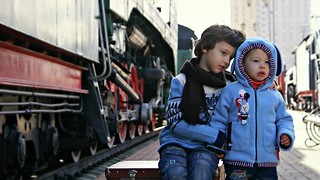Theatre: East
Torrents of obscenities, fists and bodily fluids: Adam Hunt on the opening night of Berkoff’s East at Corpus Playroom

Perhaps not quite Marat/Sade (the only person to walk out of tonight’s performance did so on account of a coughing fit), this production was nevertheless uncompromising in its delivery of Berkoff’s ‘Elegy for the East End and its Energetic Waste’. Set in 1960s London, its portrayal of the tensions of adolescence in the East End - sexual, racial, physical and otherwise - could in fact be equally applied to any city today.
Most remarkable is the language, a fusion of Shakespearean sonnet and Cockney barrow boy, which must surely have been influenced by Berkoff’s rôle in A Clockwork Orange just a few years before the play was written. Director Arthur Kendrick’s decision to intersperse scenes with slightly incongruous musical interludes lent the performance overtones of a perverse carnival. The diminutive size of the Corpus Playroom magnified this youthful exuberance to the point of (and sometimes beyond) excess. The sparse set therefore seemed a well-justified choice, and allowed the cast to capitalise on the physicality that veined the production. Particularly memorable was Les (Guy Woolf) and Mike’s (Justin Blanchard) piggy-back motorcycle, replete with chugging motor, as well as an abundance of appropriately testosterone-fuelled fights.

So visceral and relentless was much of the action, that the slightly bizarre element of metatheatre halfway through was particularly powerful. Whilst it is initially quite enjoyable to snigger at the plethora of anatomical euphemisms, there are times when the sheer sexuality becomes overwhelming, and the discomfort this induced in the audience was, at times, audible.
A major theme of the play is the concept of manhood, exemplified by archetypal lads Mike and Les, whose machismo sometimes veers towards the ridiculous in a form of brilliant self-parody. The relationship between the pair - at times filial, but often rather more bestial in nature - was engaging. Add to this the character of Dad (Rupert Mercer), whose bigotry was delivered with a worrying nonchalance, and there is certainly no lack of masculinity in its basest form. If anything, Dad was portrayed slightly softer than I had expected, given his preoccupation with an era of marches, Mosley and beating up “Kikes”. The moments of comic relief that Mercer provided were therefore quite refreshing in what could otherwise have been a relentlessly bleak affair.
The rampant masculinity was by no means limited to the men. Sylv (Olivia Vaughan-Fowler) laments the confines of her gender, again with Shakespearean echoes, but with a frankness equal, if not greater than that of the boys. Vaughan-Fowler certainly captured the frustrated sexuality of this part, and gave hints of the “filth” that was the subject of Mike’s devotion to her.

Whereas the constraints of her sex rile Sylv, Claudia Blunt’s Mum is more pacified. Her distant mutterings about popular culture throw the explosive behaviour of the other characters into sharp relief, and Blunt’s make-up - like the long-suffering Judy to Mercer’s Punch, to continue the carnival theme - add an almost surreal quality to her monologues. Given that most of our insight into these characters arise through these monologues, the inventive use of lighting was a particular success; even if it did highlight quite how much spit accompanied some of the invective, this was curiously appropriate.
But if the torrents of obscenities, fists and bodily fluids (mostly, I hasten to add, figurative, with the exception of a particularly gruesome scene in a dark cinema) aren’t too much, then East can be thoroughly recommended as an antidote to the more saccharine depictions of adolescent relationships and sexuality on offer in Cambridge’s theatres this week.
 News / Cambridge climbs to third in world Uni rankings11 October 2025
News / Cambridge climbs to third in world Uni rankings11 October 2025 Features / How to spend a Cambridge summer12 October 2025
Features / How to spend a Cambridge summer12 October 2025 Comment / Bonnie Blue is the enemy, not the face, of female liberation13 October 2025
Comment / Bonnie Blue is the enemy, not the face, of female liberation13 October 2025 News / Join Varsity this Michaelmas13 October 2025
News / Join Varsity this Michaelmas13 October 2025 News / Tompkins Table 2025: Trinity widens gap on Christ’s19 August 2025
News / Tompkins Table 2025: Trinity widens gap on Christ’s19 August 2025









